eCommerce Email Marketing in 2024: Guide & Top 10 Providers
eCommerce email marketing is a digital marketing strategy that allows online businesses to communicate directly with their customers through personalized and targeted email messages.
Leveraging email marketing tools for eCommerce marketing efforts enables businesses to:
- build relationships with current customers,
- promote products,
- and support sales in the digital marketplace.
This guide provides a detailed look at what eCommerce email marketing is, its advantages and challenges, and a comparison of leading eCommerce email marketing tools.
Top 10 eCommerce email marketing software
| Vendor | Number of reviews | Average rating | Starting price/month | Free trial | Free plan |
|---|---|---|---|---|---|
| Campaigner | 606 | 3.9 | $59 | 30-day | ❌ |
| ActiveCampaign | 13,375 | 4.5 | $29 | 14-day | ❌ |
| Constant Contact | 8,314 | 4.1 | $12 | 60-day | ❌ |
| MailerLite | 2,681 | 4.7 | $18 | 30-day | 12,000 emails/month |
| Brevo | 2,517 | 4.5 | $25 | ❌ | 300 emails/day |
| Omnisend | 1,574 | 4.6 | $16 | ❌ | 500 emails/month |
| Klaviyo | 1,568 | 4.6 | $45 | ❌ | 500 emails per month |
| GetResponse | 1,499 | 4.2 | $98 | 30-day | ❌ |
| Moosend | 755 | 4.7 | $9 | 30-day | ❌ |
| Drip | 459 | 4.4 | $39 | 14-day | ❌ |
Note: Sponsors are listed at the top with their links. The rest are sorted based on the number of reviews.
When choosing the top 10 eCommerce email marketing software, we based our selection on:
- more than 400 reviews on B2B review platforms G2 and Capterra,
- at least 30 employees according to LinkedIn.
For a more detailed vendor list, check out our guide on email marketing platforms.
Features comparison of top 10 eCommerce email marketing tools
| Vendor | Features |
|---|---|
| Campaigner | Marketing automation, personalization with segmentation and purchase behavior, multivariate testing,
recurring campaigns, SMTP relay.
|
| ActiveCampaign | Machine learning for predictive sending, site and event tracking, CRM
integrations for marketing and sales including lead scoring, win prediction, and split action for automations.
|
| Constant Contact | Social media integration, online training resources, event management and email
list building tools.
|
| MailerLite | Website and blog builder, email verifier feature, built-in photo editing,
comprehensive A/B testing, newsletter delivery by time zone.
|
| Brevo | AI-driven email content creation, advanced drag-and-drop email builder, interactive email
components.
|
| Omnisend | Omnichannel support with SMS, email and web push notifications, segmentation
by shopping behavior, interactive email elements like scratch cards and gift boxes.
|
| Klaviyo | 300+ pre-built integrations, predictive analytics, customer lifetime value tracking, personalized
product recommendations.
|
| GetResponse | Sales funnel features with the autofunnel tool and conversion funnel,
webinar hosting capabilities, autoresponders, live web chat.
|
| Moosend | Recipe-based automation triggers, weather-based email customization, countdown timers in emails,
AI-powered segmentation and recommendation for eCommerce sales.
|
| Drip | Advanced email editor with surveys, gamification, pop ups, slide-ins, and
sticky bars, Shopify integration, dynamic content blocks, revenue dashboards.
|
What is eCommerce email marketing?
eCommerce email marketing refers to the strategic use of email marketing strategy by online businesses to market their products or services directly to consumers.
This approach leverages the email channel to deliver:
- customized messages,
- promotional content,
- and transactional information to a segmented audience.
The aim is to enhance customer engagement, encourage customer purchases, and foster brand loyalty.
eCommerce email marketing campaigns are characterized by allowing personalized interactions that are tailored to the individual preferences and behaviors of recipients.
These campaigns thereby enhance the effectiveness of email marketing efforts and contribute to the overall growth and success of eCommerce businesses.
Check out email marketing best practices to learn more about how to effectively implement email to your marketing processes.
eCommerce email marketing automation
Automation plays a crucial role in eCommerce email marketing by streamlining various processes and enhancing the effectiveness of campaigns. Here are some key components of eCommerce email marketing automation:
Segmentation: Automation tools help segment email lists based on criteria such as demographics, purchase history, and engagement level. This segmentation ensures that customers receive relevant content, which can lead to higher open and click-through rates.
Timely communication: Automation enables the scheduling and sending of emails at optimal times.
For example, abandoned cart emails can be triggered if a customer leaves items in their shopping cart which would encourage them to complete the purchase. This timely response can help recover potentially lost sales.
Scalability: With automation, eCommerce businesses can manage large volumes of email contacts and campaigns, allowing them to scale their marketing efforts.
Consistency and frequency: Automation ensures that eCommerce marketing communications are regular and consistent which would help to maintain customer engagement and brand presence.
With automation, eCommerce businesses can manage routine communications like weekly newsletters, promotional announcements, and seasonal offers without manual intervention.
Testing and optimization: Automation tools often include features for A/B testing different email elements, such as subject lines, content, and images. This data-driven approach allows eCommerce marketers to optimize their emails for better performance based on actual user responses.
Performance tracking and analytics: With detailed analytics on email campaign performance, such as metrics like open rates, click-through rates, and conversions, automation tools can provide insights that are vital for understanding the effectiveness of different strategies and making informed decisions.
Types of effective eCommerce email campaigns
eCommerce email campaigns come in various formats, each designed to serve specific purposes along the customer journey. Understanding and effectively implementing these emails can enhance customer engagement and drive sales. Here are some examples of eCommerce email marketing campaigns:
Welcome emails
The purpose of a welcome email is to greet new subscribers and introduce them to your brand. This process is considered as the first step in building a relationship with your new subscribers.
Welcome emails usually include a greeting, a brief introduction to the brand, information on what subscribers can expect from future emails, and possibly a first-purchase discount or offer.
Welcome emails often have higher open and conversion rates, which would make these types of marketing emails a crucial touchpoint for setting the tone of your relationship with new subscribers.
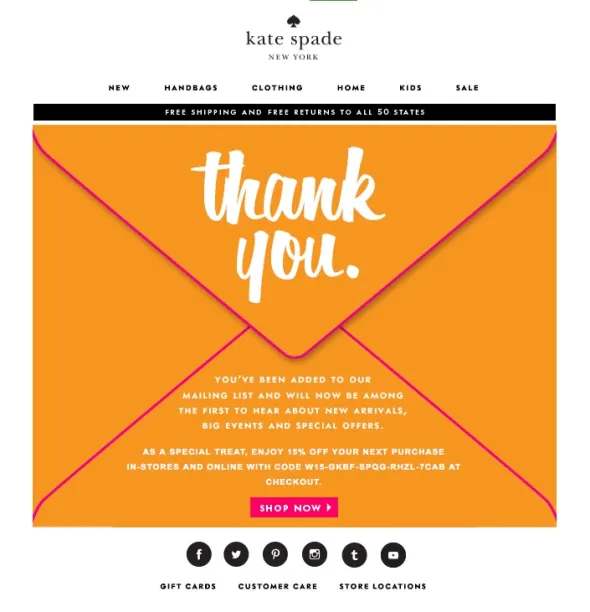
Figure 1: Welcome emails example by Kate Spade.1
Abandoned cart emails
These eCommerce marketing emails aim to remind customers of items they left in their shopping cart without completing the purchase and encourage them to return and complete their transaction.
Abandoned cart emails include a clear reminder of what’s in their cart, a call-to-action (CTA) to complete the purchase, accompanied by a time-sensitive discount or free shipping offer to incentivize immediate action.
These emails can recover lost sales by capturing your existing customers who showed high purchase intent but were distracted or hesitated at the last moment.
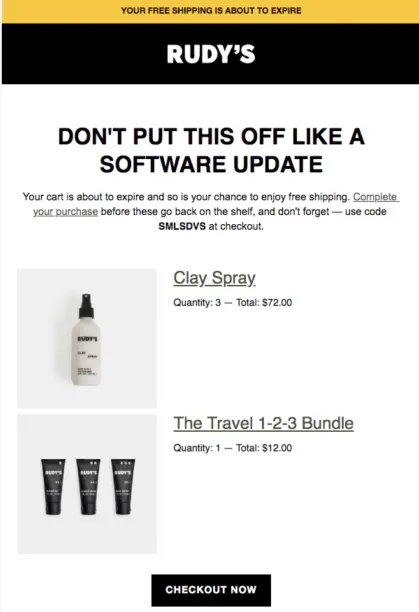
Figure 2: Abandoned cart email example by Rudy’s.2
Promotional emails and seasonal campaigns
Promotional emails and seasonal campaigns are designed to drive sales through time-limited offers, deals, or by highlighting seasonal products.
These emails usually include engaging visuals of the products on offer, clear details of the promotion or discounts, and a visible CTA. Moreover, incorporating a sense of urgency to the promotional and seasonal campaign emails (e.g., “Sale ends tonight!”) can boost effectiveness.
These campaigns can support sales during specific periods and introduce new customers to your product range.
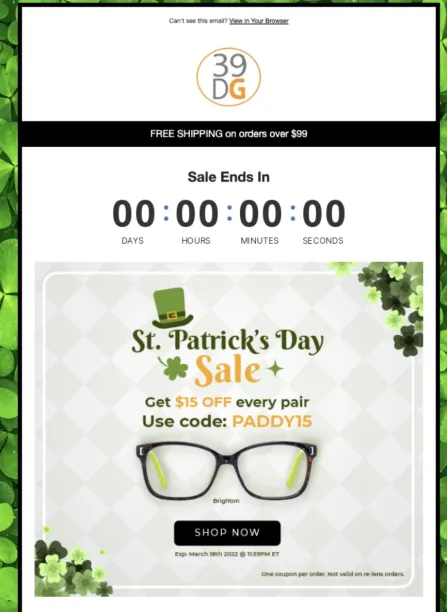
Figure 3: Promotional emails example by 39DollarGlasses.3
Loyalty and reward emails
The purpose of sending loyalty and reward emails is to reward repeat customers, enhance customer loyalty, and encourage customers to continue engaging with your brand.
These emails usually include details of the loyalty program, how it works, and the benefits that the customer can expect. For existing members, updates on their points balance or how close they are to the next reward can motivate further purchases.
These emails reinforce positive behavior like repeat purchases and foster a deeper emotional connection with the brand which would lead to higher lifetime value from customers.
Restock emails
Restock emails in eCommerce email marketing primarily aim to inform customers that previously unavailable products are now back in stock, addressing the direct interest expressed by potential buyers.
The most crucial component of these emails is the timely notification, which capitalizes on the high level of existing interest and urgency to purchase. Featuring clear and compelling calls to action (CTAs) like “Shop Now” is key to converting this interest into immediate sales.
The impact of restock emails is their ability to increase sales by targeting customers already inclined to purchase, thereby not only driving revenue but also enhancing customer satisfaction by keeping them informed and engaged with the brand.

Figure 4: Restock emails example by Uniqlo.4
Product recommendation and upsell emails
Product recommendation and upsell emails enable personalized shopping experiences by suggesting products that are relevant based on past purchases or browsing behavior.
These emails include personalized product recommendations and easy navigation to view and purchase these products.
By showing customers items that match their interests and needs, these product recommendation and upsell emails can increase average order value and strengthen customer’s engagement with the brand.
Customer feedback emails
Customer feedback emails in eCommerce email marketing are designed to gather input and opinions from customers regarding their shopping experience or products purchased.
The most vital element within these emails is the clear and direct request for feedback, often accompanied by a simple and user-friendly feedback mechanism, such as a survey link or a rating system.
Customer feedback emails provide valuable insights to an eCommerce business to improve offerings and customer service, thereby enhancing the overall customer experience and fostering a sense of value and engagement among customers.
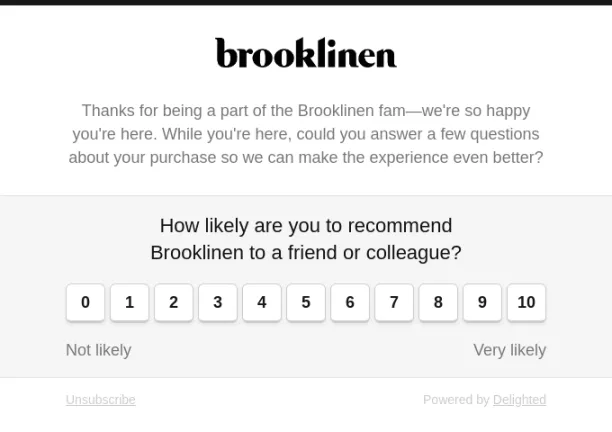
Figure 5: Customer feedback email example by Brooklinen.5
Re-engagement campaigns
Re-engagement campaigns are designed to win back customers who haven’t interacted with your brand or made a purchase in a while.
These emails usually include a compelling subject line to grab attention, a special offer or incentive to return, and a questionnaire to understand their lack of engagement.
These campaigns can revive dormant customer relationships by bringing back valuable customers who might have otherwise been lost.
Newsletter emails
The purpose of newsletter emails is to keep subscribers informed and engaged with regular updates, valuable content, and insights related to a brand or industry.
They serve as a tool for maintaining continuous contact with an audience, fostering a sense of community, and building a relationship beyond transactional interactions.
Through curated content such as articles, tips, company news, and product updates, newsletters aim to provide useful information to email subscribers, enhance brand awareness, and encourage engagement.
Benefits of Email marketing for eCommerce businesses
Email marketing offers numerous benefits for eCommerce businesses which would make it an essential component of digital marketing strategies. eCommerce email marketing benefits include:
Cost-effective
Email marketing is known for its high ROI, often outperforming other marketing channels. The costs associated with sending marketing emails are relatively low, especially when compared to traditional advertising or even some digital channels.
Personalized
Email marketing allows more personalized content by ensuring messages are relevant to each recipient. High personalization is achieved by tailoring content based on users’ past purchases, browsing behavior, or demographic information.
Targeted communication
Leveraging an effective eCommerce email marketing strategy would enable you to have a direct line to your customers by sending targeted messages. This approach ensures your message is received and can be acted upon, unlike more passive forms of advertising.
Measurable results
With email marketing, the performance of your emails can be tracked and measured from open rates and click-through rates to conversion rates. By analyzing these key email marketing metrics, you can optimize your eCommerce email campaigns for better performance.
Loyal customers
Regular and personalized email communication can strengthen customer relationships and support customer retention. eCommerce email marketing can keep customers informed about new products, special offers, and other news.
Boost sales and traffic
Well-crafted eCommerce marketing emails with compelling calls-to-action can drive traffic to your eCommerce site and directly impact sales, especially with promotional content or exclusive offers for email subscribers.
Automation opportunities
From sending automated welcome emails to follow-ups after a purchase, eCommerce email marketing software enables you to save time and ensure consistent communication with your existing customers with automated email campaigns.
Community building
Beyond direct sales, eCommerce email marketing can help in building a community around your brand by sharing engaging content and insights that resonate with your audience.
Long-term value
By building a database of subscribers who have opted into your communications, you’re investing in a long-term asset for your business. This audience can be nurtured and grown over time, providing ongoing value.
Check out email marketing benefits for a more comprehensive overview.
Challenges in eCommerce email marketing
Implementing an eCommerce email marketing strategy into your marketing efforts comes with its own set of challenges. Addressing these issues is key to maximizing the potential of eCommerce email marketing campaigns:
Deliverability issues
Ensuring emails successfully land in the inbox rather than the spam folder can be a hurdle due to strict email filters.
It is crucial to comply with eCommerce email marketing providers’ guidelines to maintain a healthy sender reputation for your eCommerce email marketing campaigns.
High competition
Customers’ inboxes are often flooded with emails from various brands. Standing out among numerous promotional messages requires creative, engaging, and highly personalized content.
Maintaining engagement
Keeping subscribers engaged over time is challenging, especially with the risk of content fatigue.
Continuously delivering value through relevant and interesting content is necessary to keep open rates and engagement high.
List attrition
Email lists naturally degrade over time due to factors like email address changes or unsubscribes.
Actively growing and refreshing the email list is essential to minimize this problem. Most eCommerce email marketing software provides features to clean and manage your email lists.
Segmentation and personalization
Effectively segmenting the email list and personalizing content can be complex but is vital for improving engagement and conversion rates.
Mobile optimization
With an increasing number of emails being opened on mobile devices, creating eCommerce marketing emails that are optimized for mobile viewing is crucial. Poor mobile experiences can lead to lower engagement and conversion rates.
Compliance with regulations
Adhering to email marketing laws and regulations such as GDPR, CAN-SPAM, and others is essential. Non-compliance can result in damaging the reputation of eCommerce brands.
Integration with other marketing channels
Effectively integrating eCommerce email marketing with other digital marketing strategies (like social media, content marketing, and SEO) for a cohesive marketing approach can be complex but is necessary to maximize impact.
For a more detailed explanation, check out eCommerce challenges.
Further reading:
- eCommerce Email Marketing Statistics in 2024
- 20 Email Marketing Case Studies in 2024
- Top 10 AI Email Marketing Tools in 2024
- Top 8 Free Email Marketing Software in 2024
- Email Marketing Pricing in 2024: Comparison of Top 15 Providers
External links:
- 1. “15 Incredible Examples of Welcome Emails (eCommerce)“. Convertcart. Retrieved April 5, 2024
- 2. “16 Strong Abandoned Cart Email Examples (2024)“. Shopify. Retrieved April 5, 2024
- 3. “34 Best Promotional Emails to Inspire Your Campaign“. Klientboost. Retrieved April 5, 2024
- 4. “10 Back in Stock Email Best Practices to Drive Sales“. Woostify. Retrieved April 5, 2024
- 5. “Ecommerce Feedback Email Templates to Win Back Customers“. RetainIQ. Retrieved April 5, 2024

Cem is the principal analyst at AIMultiple since 2017. AIMultiple informs hundreds of thousands of businesses (as per Similarweb) including 60% of Fortune 500 every month.
Cem's work has been cited by leading global publications including Business Insider, Forbes, Washington Post, global firms like Deloitte, HPE, NGOs like World Economic Forum and supranational organizations like European Commission. You can see more reputable companies and media that referenced AIMultiple.
Throughout his career, Cem served as a tech consultant, tech buyer and tech entrepreneur. He advised enterprises on their technology decisions at McKinsey & Company and Altman Solon for more than a decade. He also published a McKinsey report on digitalization.
He led technology strategy and procurement of a telco while reporting to the CEO. He has also led commercial growth of deep tech company Hypatos that reached a 7 digit annual recurring revenue and a 9 digit valuation from 0 within 2 years. Cem's work in Hypatos was covered by leading technology publications like TechCrunch and Business Insider.
Cem regularly speaks at international technology conferences. He graduated from Bogazici University as a computer engineer and holds an MBA from Columbia Business School.
Sources:
AIMultiple.com Traffic Analytics, Ranking & Audience, Similarweb.
Why Microsoft, IBM, and Google Are Ramping up Efforts on AI Ethics, Business Insider.
Microsoft invests $1 billion in OpenAI to pursue artificial intelligence that’s smarter than we are, Washington Post.
Data management barriers to AI success, Deloitte.
Empowering AI Leadership: AI C-Suite Toolkit, World Economic Forum.
Science, Research and Innovation Performance of the EU, European Commission.
Public-sector digitization: The trillion-dollar challenge, McKinsey & Company.
Hypatos gets $11.8M for a deep learning approach to document processing, TechCrunch.
We got an exclusive look at the pitch deck AI startup Hypatos used to raise $11 million, Business Insider.
To stay up-to-date on B2B tech & accelerate your enterprise:
Follow on
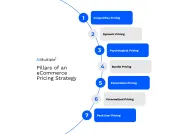
Comments
Your email address will not be published. All fields are required.